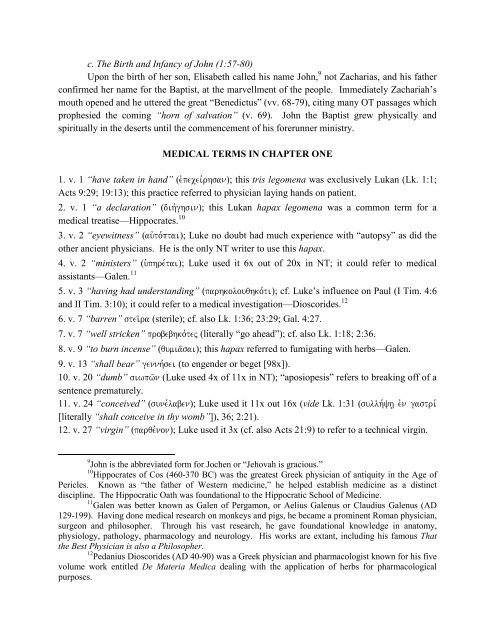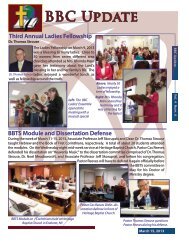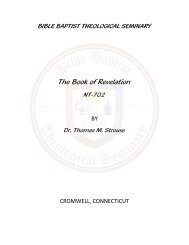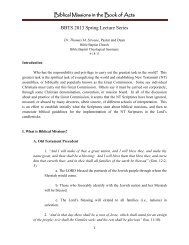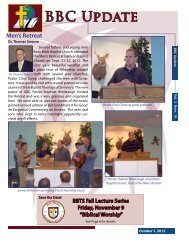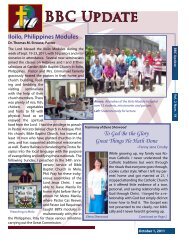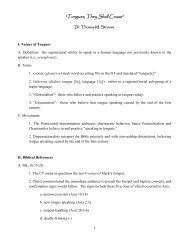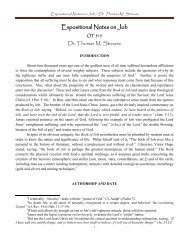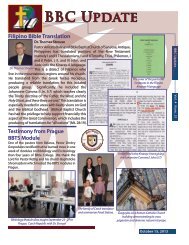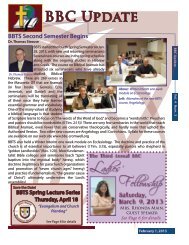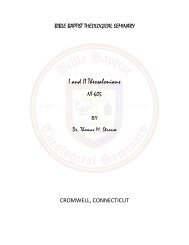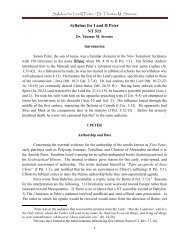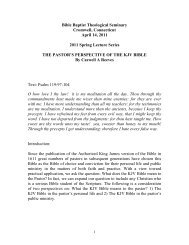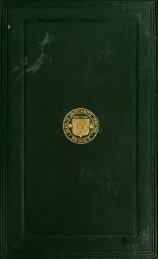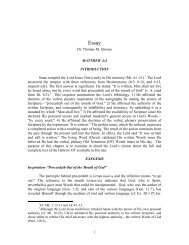Commentary on Luke's Gospel with Emphasis on Medical Terms
Commentary on Luke's Gospel with Emphasis on Medical Terms
Commentary on Luke's Gospel with Emphasis on Medical Terms
Create successful ePaper yourself
Turn your PDF publications into a flip-book with our unique Google optimized e-Paper software.
c. The Birth and Infancy of John (1:57-80)<br />
Up<strong>on</strong> the birth of her s<strong>on</strong>, Elisabeth called his name John, 9 not Zacharias, and his father<br />
c<strong>on</strong>firmed her name for the Baptist, at the marvellment of the people. Immediately Zachariah’s<br />
mouth opened and he uttered the great “Benedictus” (vv. 68-79), citing many OT passages which<br />
prophesied the coming “horn of salvati<strong>on</strong>” (v. 69). John the Baptist grew physically and<br />
spiritually in the deserts until the commencement of his forerunner ministry.<br />
MEDICAL TERMS IN CHAPTER ONE<br />
1. v. 1 “have taken in hand” (evpecei,rhsan); this tris legomena was exclusively Lukan (Lk. 1:1;<br />
Acts 9:29; 19:13); this practice referred to physician laying hands <strong>on</strong> patient.<br />
2. v. 1 “a declarati<strong>on</strong>” (dih,ghsin); this Lukan hapax legomena was a comm<strong>on</strong> term for a<br />
medical treatise—Hippocrates. 10<br />
3. v. 2 “eyewitness” (auvto,ptai); Luke no doubt had much experience <strong>with</strong> “autopsy” as did the<br />
other ancient physicians. He is the <strong>on</strong>ly NT writer to use this hapax.<br />
4. v. 2 “ministers” (u`phre,tai); Luke used it 6x out of 20x in NT; it could refer to medical<br />
assistants—Galen. 11<br />
5. v. 3 “having had understanding” (parhkolouqhko,ti); cf. Luke’s influence <strong>on</strong> Paul (I Tim. 4:6<br />
and II Tim. 3:10); it could refer to a medical investigati<strong>on</strong>—Dioscorides. 12<br />
6. v. 7 “barren” stei/ra (sterile); cf. also Lk. 1:36; 23:29; Gal. 4:27.<br />
7. v. 7 “well stricken” probebhko,tej (literally “go ahead”); cf. also Lk. 1:18; 2:36.<br />
8. v. 9 “to burn incense” (qumia/sai); this hapax referred to fumigating <strong>with</strong> herbs—Galen.<br />
9. v. 13 “shall bear” gennh,sei (to engender or beget [98x]).<br />
10. v. 20 “dumb” siwpw/n (Luke used 4x of 11x in NT); “aposiopesis” refers to breaking off of a<br />
sentence prematurely.<br />
11. v. 24 “c<strong>on</strong>ceived” (sune,laben); Luke used it 11x out 16x (vide Lk. 1:31 (sullh,yh| evn gastri,<br />
[literally “shalt c<strong>on</strong>ceive in thy womb”]), 36; 2:21).<br />
12. v. 27 “virgin” (parqe,n<strong>on</strong>); Luke used it 3x (cf. also Acts 21:9) to refer to a technical virgin.<br />
9 John is the abbreviated form for Jochen or “Jehovah is gracious.”<br />
10 Hippocrates of Cos (460-370 BC) was the greatest Greek physician of antiquity in the Age of<br />
Pericles. Known as “the father of Western medicine,” he helped establish medicine as a distinct<br />
discipline. The Hippocratic Oath was foundati<strong>on</strong>al to the Hippocratic School of Medicine.<br />
11 Galen was better known as Galen of Pergam<strong>on</strong>, or Aelius Galenus or Claudius Galenus (AD<br />
129-199). Having d<strong>on</strong>e medical research <strong>on</strong> m<strong>on</strong>keys and pigs, he became a prominent Roman physician,<br />
surge<strong>on</strong> and philosopher. Through his vast research, he gave foundati<strong>on</strong>al knowledge in anatomy,<br />
physiology, pathology, pharmacology and neurology. His works are extant, including his famous That<br />
the Best Physician is also a Philosopher.<br />
12 Pedanius Dioscorides (AD 40-90) was a Greek physician and pharmacologist known for his five<br />
volume work entitled De Materia Medica dealing <strong>with</strong> the applicati<strong>on</strong> of herbs for pharmacological<br />
purposes.


